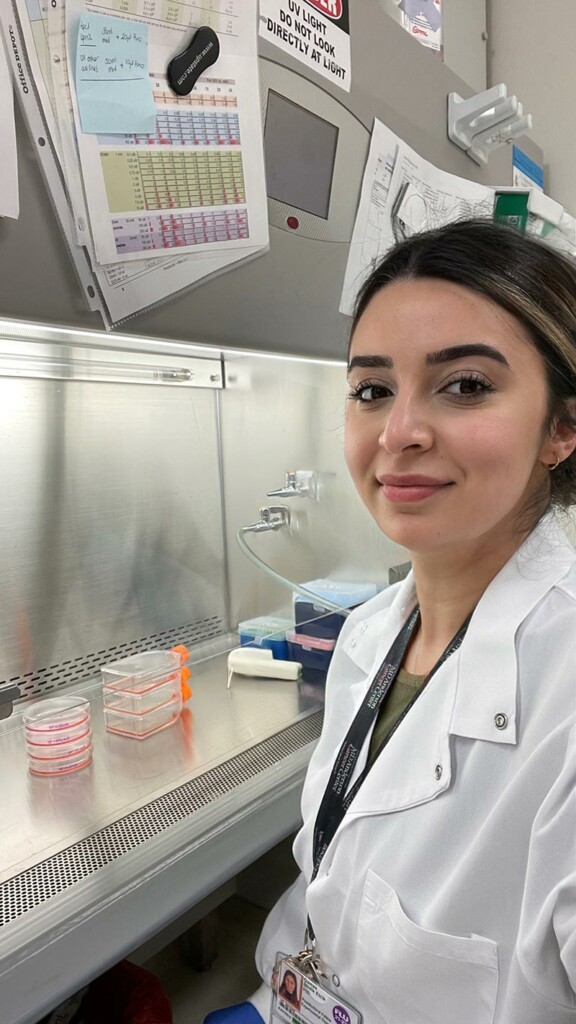
Dr. Gamze Bildik Elcik, postdoctoral fellow in the Department of Experimental Therapeutics at MD Anderson Cancer Center, is a 2022 recipient of OCRA’s Mentored Investigator Grant. With her project, “DIRAS3 Inhibits KRAS and Sensitizes LGSOC Cells to Anti-autophagic Therapy,” Dr. Bildik Elcik aims to address the issue of chemotherapy resistance in a large subset of low-grade serous ovarian cancers, by exploiting a common signaling pathway mutation that appears vulnerable to a growth-inhibiting protein.
OCRA-funded scientists are making significant advances toward better prevention, treatments, and a cure. Make your year-end gift today to support future breakthroughs.
What initially sparked your interest in science?
As a child, I was drawn to science books. From the first time I was asked what I would be when I grew up, my answer was always the same: a geneticist. My interest in genetics led me to choose molecular biology and genetics as my major for my undergraduate degree. It was the first step of my science career and what led to my interest in cancer biology.
What drew you to the field of ovarian cancer research?
There is not a single person who hasn’t been touched by cancer or has had, or will have, a friend or family member diagnosed with the disease. For most of my career, I’ve paid close attention to women’s health research. And even in 2022, there’s still nowhere near enough research when it comes to women’s health. Today, despite the spectacular progress in cancer biology, there remain many unsettled questions regarding ovarian cancer prevention, diagnosis, recurrence, treatment, and resistance to treatment. This dismal state of affairs reinforces the need for more research to develop new treatment approaches to reduce cancer incidence, morbidity, and mortality.

Can you explain your research project?
My project focuses on an underrepresented subgroup of ovarian tumors called low-grade serous ovarian cancer. Despite slower growth, these cancers are often resistant to conventional chemotherapy. Almost half of these tumors carry mutations in the KRAS signaling pathway. One way to think about KRAS is to see it as the accelerator of a car. When KRAS undergoes a mutation, the accelerator pedal is stuck — speeding up cell growth and division. Overactive KRAS has been difficult to inhibit because single KRAS proteins bind to each other forming pairs and clusters. My project proposes a strategy to block mutant KRAS activity with a protein called DIRAS3, which you may think of as the brakes of the car. Our preliminary results show that DIRAS3 induces autophagy (self-digestion) in KRAS-mutant ovarian cancer cells and enhances their vulnerability to autophagy inhibition therapies.
What motivates you to persist in your research?
Becoming a peer-reviewed researcher requires an interest in science, multiple degrees from universities, career acceptance into research fields, and then time to perform said research. This is a very long cycle and what drives me in the ovarian cancer research field is to contribute to an improvement meaningfully changing the lives of women with ovarian cancer.
What is your hope for the field of ovarian cancer research?
I’m a big believer that in order to solve a problem, we need to understand more about the mechanisms causing the problem. The good news is that we’re seeing more rapid improvements with better state-of-the-art techniques in place. Even though ovarian cancer has been a problematic disease, I remain optimistic about the future of ovarian cancer treatments with better research and increased awareness thanks to nonprofit organizations like OCRA.
If you had the opportunity to personally thank someone from the OCRA community who supported your work, what would you say?
With your support, we are one step closer to developing a better strategy to cure ovarian cancer. You are truly making a difference for ovarian cancer research and women with ovarian cancer.
See more OCRA-funded research projects focused on therapeutic targeting.


